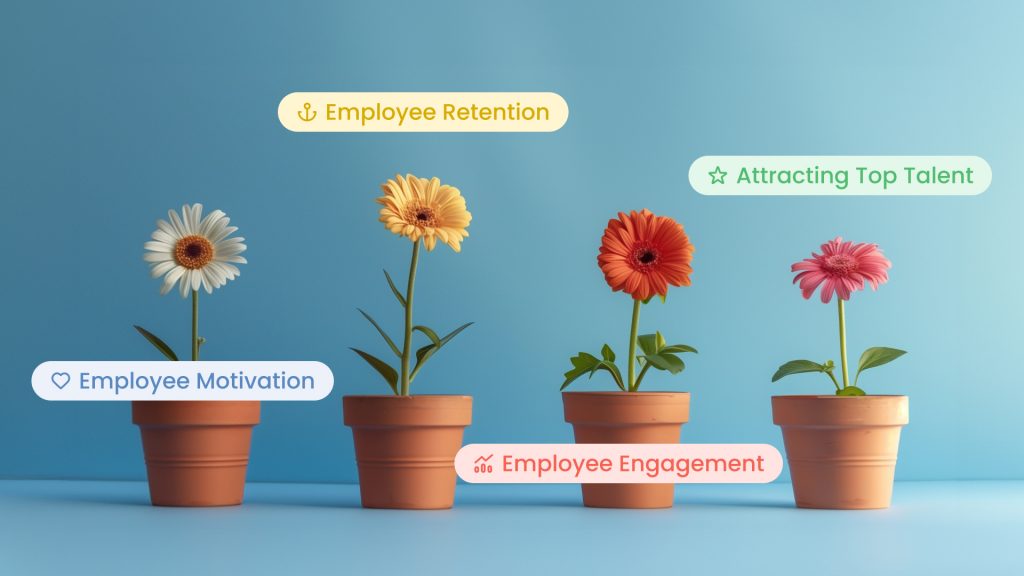Besides hiring and managing talents, compensation is one key area HR teams prioritize. However, retaining talents goes beyond paying just salaries. Employees also want to feel you acknowledge and value their efforts.
As highlighted by Nectar’s report, about 84% of employees believe recognition enhances their motivation to succeed. And that’s where merit increase comes in. It helps employees feel appreciated and fosters a sense of loyalty to your organization.
But understanding what is a merit increase can be confusing, especially with the types of salary increases. It becomes crucial to know the merit increase meaning and difference between a raise.
In this article, we’ll go through the basics of the merit increase meaning and also provide tips on deciding who gets a merit increase and what it takes to implement one in your organization.
What is a merit increase?
A merit increase is a salary raise an employee gets as a reward for outstanding performance and tireless contributions to achieving company goals. It is often a pay increase or bonus designed to encourage and recognize individual accomplishments within an organization.
For example, say a marketing team member in your organization exceeds their KPIs by 30% for a marketing campaign. The HR team may increase their annual salary by 10% as recognition for an exceptional contribution to the company’s growth.
When properly implemented, this pay-for-performance method for employee appreciation boosts employee engagement and productivity. It also helps managers and HR teams determine which employees receive promotions or not.
What is the difference between a merit increase vs a raise?
Now that we’ve covered what is a merit increase, another vital angle to examine is merit increase vs a raise.
Though merit increase vs raise are two salary adjustments, they aren’t the same. For one, by merit increase meaning, it’s a salary increment based on performance. It often rewards and recognizes top-performing employees while inspiring others to perform better. Furthermore, it’s usually given as a percentage of an employee’s salary, and it differs from one employee to another depending on their performance.
A raise, on the other hand, is a general salary increase that isn’t necessarily tied to employee performance. Instead, it’s based on tenure, inflation, or to improve employee standard of living. Also, it may be given to all or specific groups of employees as a fixed amount or a percentage of the employee’s salary.
What are the benefits of a merit increase?

According to Spring Works’ report, 57% of employees say they prefer recognition in the form of a cash bonus or raise. But what do organizations stand to gain from this? Here’s why a merit increase is beneficial for your organization:
Increase employee motivation
According to Springworks, 70% of employees believe motivation and morale will increase if employers appreciate them. And that’s one function of merit increase meaning.
By recognizing workers’ achievements, performance, and contributions to the organization’s success, pay increase motivates employees to be more productive. This recognition boosts morale, not only for the employee but also for other team members.
Improve employee retention
Everyone loves to be rewarded for hard work. Offering top-performing workers a merit increase helps retain valuable talent within the organization. It also reduces attrition rates and keeps staff loyal to your organization. Furthermore, when employees are better motivated through a pay increase, they’ll enjoy their work environment and, as SHRM’s study found, will be 68% less likely to quit.
Enhance employee engagement
Findings from Nectar’s 2023 survey found that 82% of employees believe recognition for their efforts at work improves engagement. By offering pay increases by merit, you make talents feel seen. When this happens, they’ll better participate in work activities because they know the company values them. Ultimately, they’ll see no need to quit but remain with your organization and actively engage in their roles.
Read next: 20 Strategic Employee Engagement Survey Questions
Attract top talent
Appreciating top talents through a merit increase vs raise helps create a more productive company culture. And when employees perceive the company positively, it often results in lower turnover and attracts and retains more high-performing talent.
Glassdoor noted that 86% of job seekers review company ratings and reviews before applying. If current and former employees have positive views about your company’s compensation practices, it’ll encourage potential talent to apply. Thus, it’ll expand your workforce and enhance your organization’s competitive advantage in the labor market.
How to decide who gets a merit increase?
Now that we’ve established the merit increase meaning and its benefits, the next question in line is deciding who gets a merit increase. Here are some considerations to take into account for a fair merit increase while aligning with company goals:
Performance
To maximize the benefits of a merit increase, high performers should be prioritized when deciding eligibility. Thoroughly consider each employee’s achievement and evaluate your team’s output in terms of company goals, work quality, key performance indicators, and other performance metrics.
Contributions and value
Employees who regularly exceed expectations or make significant contributions to the growth of your organization should be rewarded with a merit increase as a sign of appreciation.
Company performance
Company success is always a result of the collective effort of your team. So, when your organization smashes goals or generates more revenue, extend the success to employees through a merit increase.
Industry standards
Compare your company’s compensation structures to industry practices. This will help you understand salary trends and compensation practices within your sector. It’ll also ensure your salary raises by merit are competitive and fair enough to attract and retain top talent.
Read next: Understanding and Administering Salary Adjustments
Employee potential
Assessing employee potential is crucial when determining who gets a merit increase, meaning you should focus on both past performance and future potential. Employees with high potential are likely to make substantial contributions to your organization’s success in the long run.
By recognizing employees with high prospects, HR teams can support employee career development and motivate other employees to become top talents.
Things to Consider When Creating a Merit Increase Policy
1. Define criteria
Define the objectives of your company’s merit increase policy and identify eligibility criteria. This could be employee performance reviews, company budget, internal policy, skills development, contributions to organizational success, and the employee’s value in the job market.
By defining criteria, you can ensure a fair and transparent merit increase policy, saving the company from incurring unwanted losses or potential issues.
2. Set a budget
Decide how much your organization is willing to spend on merit increase and create a budget for it. When allocating funds, consider available resources, market trends, budget restraints, and your company’s overall performance and existing compensation strategy.
3. Develop a performance rating system
Set up a performance review process to evaluate employee performance based on the established criteria. The review should include ratings that show employees’ performance levels which will help determine the size and distribution of merit increases.
4. Clearly communicate the policy
You don’t want employees wondering what is a merit increase and how it applies to them. This can be avoided with clearly communicating the policy and providing adequate information.
For example, provide clear guidelines on how merit increase vs raise will be determined, the frequency for awarding, how you intend to address concerns regarding the pay increase process, and other details.
This will help strengthen transparency and encourage open communication and feedback systems between employees and managers.
Best Practices for Implementing a Merit Increase
To ensure a successful and transparent merit increase, here are some best practices:
Conduct performance reviews
Performance reviews provide insights into each employee’s performance and identify top performers who consistently deliver great work. It also ensures merit increase decisions align with company goals, allowing employees to receive feedback and spot areas for improvement.
Therefore, determine how often you’d conduct these reviews, utilizing performance management tools for 360-degree feedback, and how data will be collected and analyzed.
Read next: A Guide to Mastering Performance Management
Ensure process is fair and transparent
Implement your merit increase policy across all employees and departments. Ensure it’s fair, transparent, and void of favoritism by strictly adhering to established criteria. This pay parity and equity is necessary for a more productive and equitable company culture.
Provide justification and explanation
Besides setting and implementing your merit increase policy, you should also explain and justify them to employees. This promotes transparency and motivation. It also clarifies expectations to avoid potential misunderstandings. When employees understand the criterias for determining a merit increase, they’ll be more motivated and focused on the company goals.
Research industry benchmarks to ensure attractiveness
Researching benchmarks in your industry is crucial to remaining competitive in the labor market. It provides insight into regular industry compensation practices so your organization’s merit increases are neither too low nor too high but in sync with trends.
Most importantly, offering increases that align with industry standards will differentiate your company in the market, strengthen your organization’s reputation, attract and retain top talent.
Focus on the future
Aside from recognizing high-performing talents, you should also consider workers with a high potential for success. Doing this encourages every employee to develop new skills, improve their capacity, and consistently contribute to the organization’s success. In addition, it signals to employees that the organization prioritizes their growth and satisfaction.
Fueling Employee Engagement with HR Tools

Administering merit increase requires careful consideration, clear communication, and adherence to company policies and regulations. While this can pose a challenge, utilizing the right HR tools can streamline the process, ensuring efficient management of merit increase.
All-in-one HR softwares like Omni can help you and your company efficiently tackle merit increases. By streamlining processes and gathering valuable insights through data analytics, our software can provide an ideal framework for businesses invested in creating a fair and transparent workplace.
Omni allows you to design, schedule, and conduct performance reviews that offer insights on promotions and advancement. From defining performance metrics to conducting evaluations, our solution provides you with real-time feedback to enhance your merit increase process, foster high performance, attract top talent, and drive growth for your modern business.
To explore why Omni is the preferred tool for modern businesses aiming to enhance employee engagement and foster an inclusive and fair workplace culture, book a demo with our team today.


